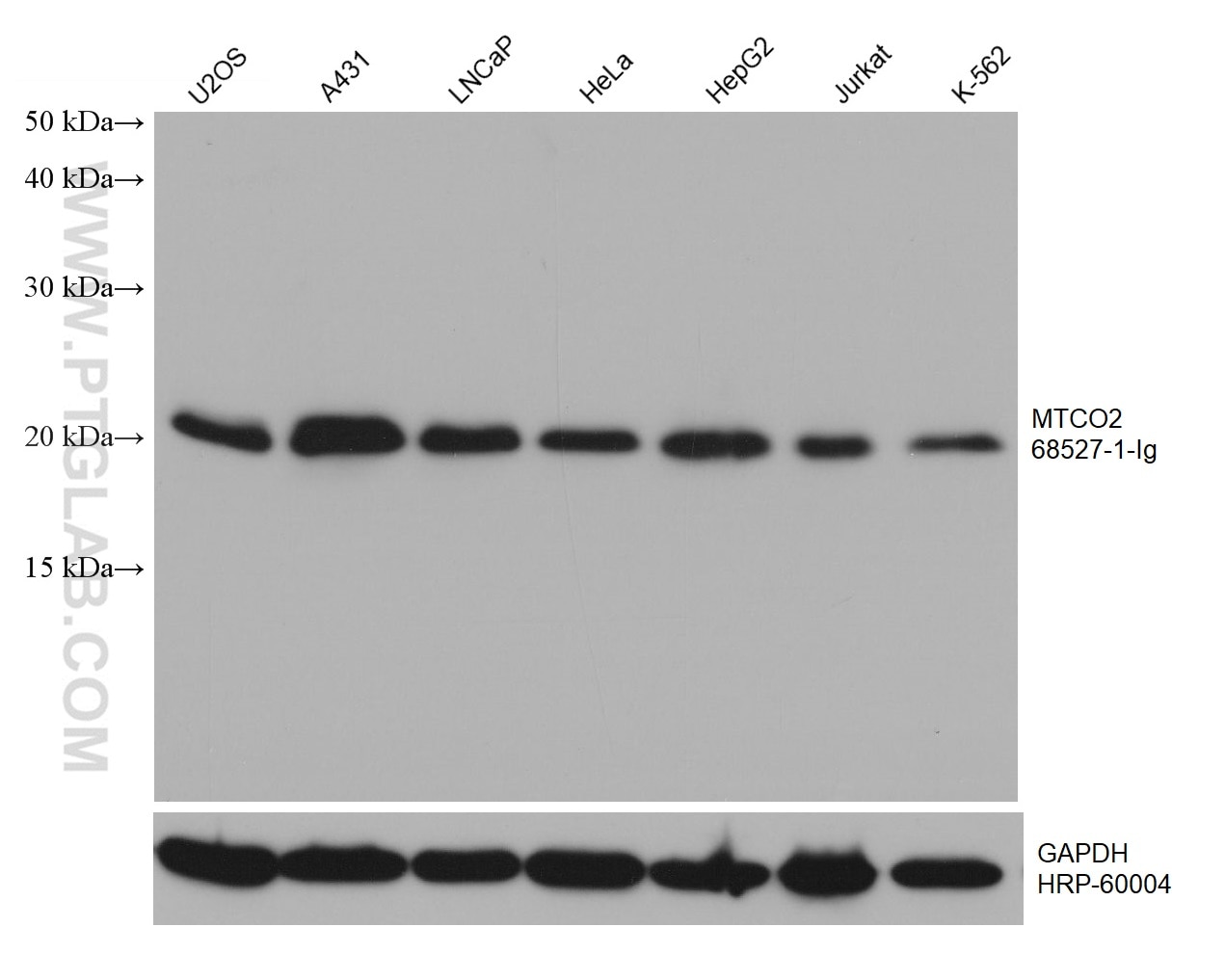MTCO2 Monoklonaler Antikörper
MTCO2 Monoklonal Antikörper für WB, ELISA
Wirt / Isotyp
Maus / IgG1
Getestete Reaktivität
human
Anwendung
WB, ELISA
Konjugation
Unkonjugiert
CloneNo.
10G14F4
Kat-Nr. : 68527-1-Ig
Synonyme
Galerie der Validierungsdaten
Geprüfte Anwendungen
| Erfolgreiche Detektion in WB | U2OS-Zellen, A431-Zellen, HeLa-Zellen, HepG2-Zellen, Jurkat-Zellen, K-562-Zellen, LNCaP-Zellen |
Empfohlene Verdünnung
| Anwendung | Verdünnung |
|---|---|
| Western Blot (WB) | WB : 1:5000-1:50000 |
| It is recommended that this reagent should be titrated in each testing system to obtain optimal results. | |
| Sample-dependent, check data in validation data gallery | |
Produktinformation
68527-1-Ig bindet in WB, ELISA MTCO2 und zeigt Reaktivität mit human
| Getestete Reaktivität | human |
| Wirt / Isotyp | Maus / IgG1 |
| Klonalität | Monoklonal |
| Typ | Antikörper |
| Immunogen | Peptid |
| Vollständiger Name | cytochrome c oxidase II |
| Berechnetes Molekulargewicht | 26 kDa |
| Beobachtetes Molekulargewicht | 23-26 kDa |
| GenBank-Zugangsnummer | YP_003024029 |
| Gene symbol | COX2 |
| Gene ID (NCBI) | 4513 |
| Konjugation | Unkonjugiert |
| Form | Liquid |
| Reinigungsmethode | Protein-G-Reinigung |
| Lagerungspuffer | PBS mit 0.02% Natriumazid und 50% Glycerin pH 7.3. |
| Lagerungsbedingungen | Bei -20°C lagern. Nach dem Versand ein Jahr lang stabil Aliquotieren ist bei -20oC Lagerung nicht notwendig. 20ul Größen enthalten 0,1% BSA. |
Hintergrundinformationen
MTCO2, also named as COII, COXII, and COX2, belongs to the cytochrome c oxidase subunit 2 family. It is the component of the respiratory chain that catalyzes the reduction of oxygen to water. Subunits 1-3 form the functional core of the enzyme complex. Subunit 2 transfers the electrons from cytochrome c via its binuclear copper A center to the bimetallic center of the catalytic subunit 1. Defects in COX2 are a cause of mitochondrial complex IV deficiency (MT-C4D).
Protokolle
| Produktspezifische Protokolle | |
|---|---|
| WB protocol for MTCO2 antibody 68527-1-Ig | Protokoll herunterladen |
| Standard-Protokolle | |
|---|---|
| Klicken Sie hier, um unsere Standardprotokolle anzuzeigen |


